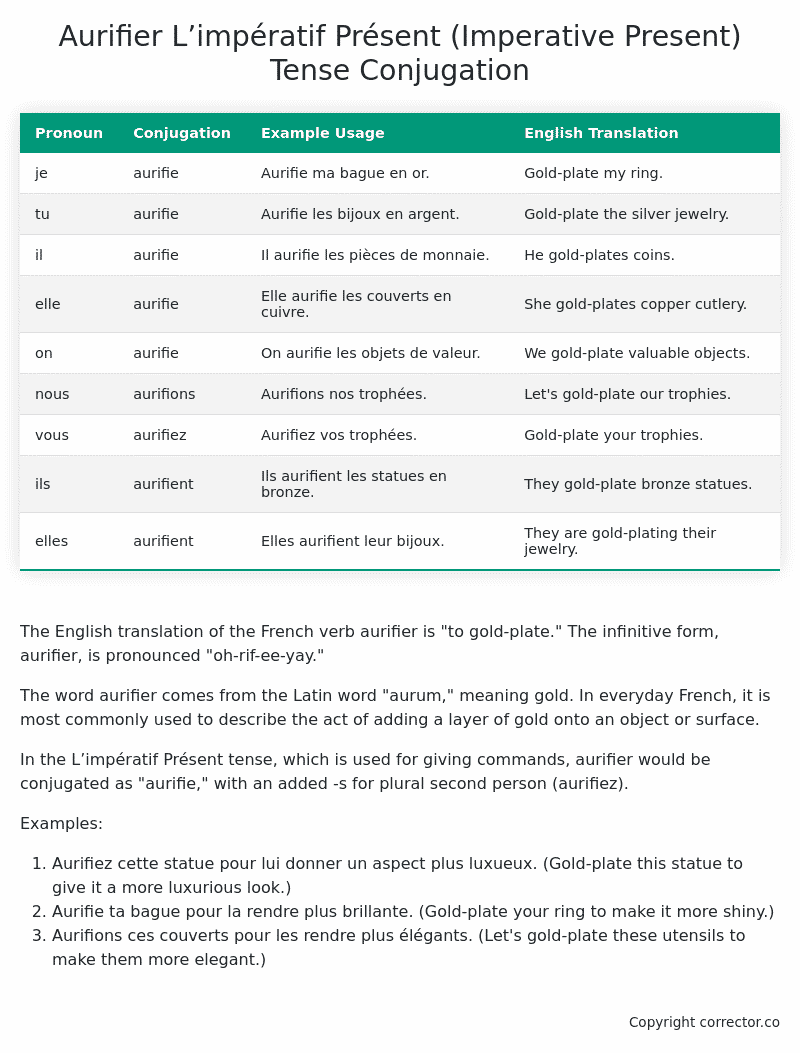L’impératif Présent (Imperative Present) Tense Conjugation of the French Verb aurifier
Introduction to the verb aurifier
The English translation of the French verb aurifier is “to gold-plate.” The infinitive form, aurifier, is pronounced “oh-rif-ee-yay.”
The word aurifier comes from the Latin word “aurum,” meaning gold. In everyday French, it is most commonly used to describe the act of adding a layer of gold onto an object or surface.
In the L’impératif Présent tense, which is used for giving commands, aurifier would be conjugated as “aurifie,” with an added -s for plural second person (aurifiez).
Examples:
- Aurifiez cette statue pour lui donner un aspect plus luxueux. (Gold-plate this statue to give it a more luxurious look.)
- Aurifie ta bague pour la rendre plus brillante. (Gold-plate your ring to make it more shiny.)
- Aurifions ces couverts pour les rendre plus élégants. (Let’s gold-plate these utensils to make them more elegant.)
Table of the L’impératif Présent (Imperative Present) Tense Conjugation of aurifier
| Pronoun | Conjugation | Example Usage | English Translation |
|---|---|---|---|
| je | aurifie | Aurifie ma bague en or. | Gold-plate my ring. |
| tu | aurifie | Aurifie les bijoux en argent. | Gold-plate the silver jewelry. |
| il | aurifie | Il aurifie les pièces de monnaie. | He gold-plates coins. |
| elle | aurifie | Elle aurifie les couverts en cuivre. | She gold-plates copper cutlery. |
| on | aurifie | On aurifie les objets de valeur. | We gold-plate valuable objects. |
| nous | aurifions | Aurifions nos trophées. | Let’s gold-plate our trophies. |
| vous | aurifiez | Aurifiez vos trophées. | Gold-plate your trophies. |
| ils | aurifient | Ils aurifient les statues en bronze. | They gold-plate bronze statues. |
| elles | aurifient | Elles aurifient leur bijoux. | They are gold-plating their jewelry. |
Other Conjugations for Aurifier.
Le Present (Present Tense) Conjugation of the French Verb aurifier
Imparfait (Imperfect) Tense Conjugation of the French Verb aurifier
Passé Simple (Simple Past) Tense Conjugation of the French Verb aurifier
Passé Composé (Present Perfect) Tense Conjugation of the French Verb aurifier
Futur Simple (Simple Future) Tense Conjugation of the French Verb aurifier
Futur Proche (Near Future) Tense Conjugation of the French Verb aurifier
Plus-que-parfait (Pluperfect) Tense Conjugation of the French Verb aurifier
Passé Antérieur (Past Anterior) Tense Conjugation of the French Verb aurifier
Futur Antérieur (Future Anterior) Tense Conjugation of the French Verb aurifier
Subjonctif Présent (Subjunctive Present) Tense Conjugation of the French Verb aurifier
Subjonctif Passé (Subjunctive Past) Tense Conjugation of the French Verb aurifier
Subjonctif Imparfait (Subjunctive Imperfect) Tense Conjugation of the French Verb aurifier
Subjonctif Plus-que-parfait (Subjunctive Pluperfect) Tense Conjugation of the French Verb aurifier
Conditionnel Présent (Conditional Present) Tense Conjugation of the French Verb aurifier
Conditionnel Passé (Conditional Past) Tense Conjugation of the French Verb aurifier
L’impératif Présent (Imperative Present) Tense Conjugation of the French Verb aurifier (this article)
L’infinitif Présent (Infinitive Present) Tense Conjugation of the French Verb aurifier
Struggling with French verbs or the language in general? Why not use our free French Grammar Checker – no registration required!
Get a FREE Download Study Sheet of this Conjugation 🔥
Simply right click the image below, click “save image” and get your free reference for the aurifier L’impératif Présent tense conjugation!

Aurifier – About the French L’impératif Présent (Imperative Present) Tense
Usage
Giving commands
Making requests
Offering advice
Expressing desires
Conjugation Formation
Interactions with other tenses
Want More?
I hope you enjoyed this article on the verb aurifier. Still in a learning mood? Check out another TOTALLY random French verb conjugation!


